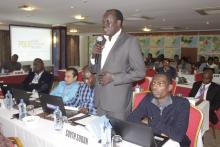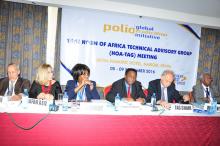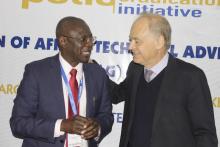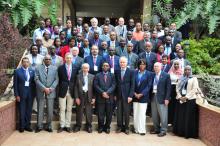Urgent Call for HOA Countries to Avert Polio Importation
Nairobi, September 9, 2016 - The Horn of Africa Polio Technical Advisory Group (TAG) meeting has ended in Nairobi with an urgent call for member countries to ‘get back on track’ if the looming threat of a possible polio virus outbreak in the region is to be averted.
Speaking at the end of the four-day meeting in Nairobi, the TAG Chair Dr Jean-Marc Olive underlined the threat of an impending importation of the virus following the outbreak in Nigeria last July.
He said that given the population movement pathways from West Africa to the region, the immunity surveillance gaps and declining routine immunization and previous history in Horn of Africa countries, the region was liable to an importation and of the virus.
Moreover, one million children in the region are inaccessible for vaccination due to conflict situations and insecurity in South Sudan, Somalia, Sudan, and Yemen, which made them very vulnerable should there be an importation of the virus.
Countries had also reduced the number of supplementary immunization activities (polio campaigns) even as gaps in the immunity and decrease in routine immunization were evident.
The region had enjoyed a near ‘polio free’ status after about two years of sustaining efforts to interrupt the spread of the virus. Countries like Somalia, South Sudan, Sudan and Yemen have however experienced great challenges in trying to reach all children due to the conflict and security situations they face.
“After the Nigerian context in which polio virus was identified in Borno state, we have to ask ourselves if there could be a Borno-like situation our countries in the Horn-of-Africa where we are missing transmission for a long period.”
He said each country has to ask: “Where is our weakest point that we must focus on?”
The virus in Nigeria is believed to have circulated without being detected for about five years and possibly in neighboring countries. Borno State is an insecure area whose access has been hampered by the Boko Haram insurgents and surveillance severely limited because close to half of settlements are inaccessible.
Three wild polio viruses (WPV type1) were found in Borno State in July and August as well as a circulating vaccine derived polio virus (cVDPV2) from an environmental sample in March 2016. Two cases of the vaccine-derived polio virus (vdpv2) were also isolated in Yemen and Kenya from environmental samples in the past six months.
Dr Olive, speaking on behalf of the TAG team, called on the countries to assess and focus on the immunity gaps which pose a major risk of outbreaks and to address the risk of the virus moving into the Horn of Africa with mobile populations.
The TAG team outlined cross-cutting and country- specific recommendations to help the countries boost immunity, strengthen emergency preparedness and avert chances of polio re-importation. Among them are, holding additional supplementary immunization activities, Polio Outbreak Simulation Exercises (POSE), updating response communication plans and better facilitation of laboratory logistics.
Speaking earlier in the meeting, Dr Jackson Kioko, Kenya Director of Medical Services noted the strides made by the region but cautioned on the need for extra vigilance given the recent Nigerian outbreak and that of the endemic countries. “As a region, there is a need to redouble our efforts to enhance the sensitivity of our surveillance activities and urgently scale up routine immunization activities,” he said.
The meeting attended by representatives from Somalia, South Sudan, Sudan, Yemen, Djibouti, Eritrea, Ethiopia, Uganda, Tanzania and Kenya, focused its discussion on the immunization status of the countries including routine immunization and surveillance as efforts used to sustain population immunity and keep the region free of polio.
Participants also discussed inactivated polio vaccine (IPV) stock-outs, bivalent oral polio vaccine (bOPV), and experiences in handling environmental surveillance, laboratory support at Kenya Medical Research Institute, polio simulation exercises, tracking nomadic and pastoral communities in especially hard to reach areas, social mobilization networks and transitioning and sustaining polio assets.
It was also attended by partners representing Global Polio Eradication Initiative, GPEI, WHO, UNICEF, CORE Group, Rotary International, CDC, American Red Cross, Bill & Melinda Gates Foundation and USAID.
__________________________________________________
For more information, please contact:
Communication Contact: Dr Jemimah Mwakisha, Email: mwakishaj [at] who.int
Technical Contact: Dr Sam Okiror, Email: okirors [at] who.int
Dr Joseph Chidiadi, Email: cjnwogu [at] yahoo.com







